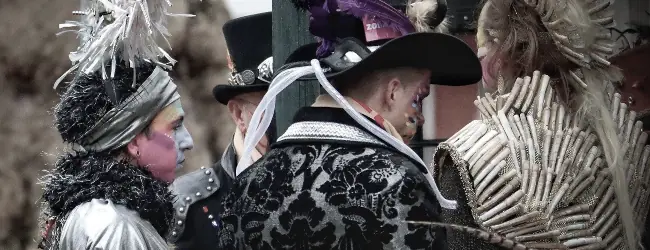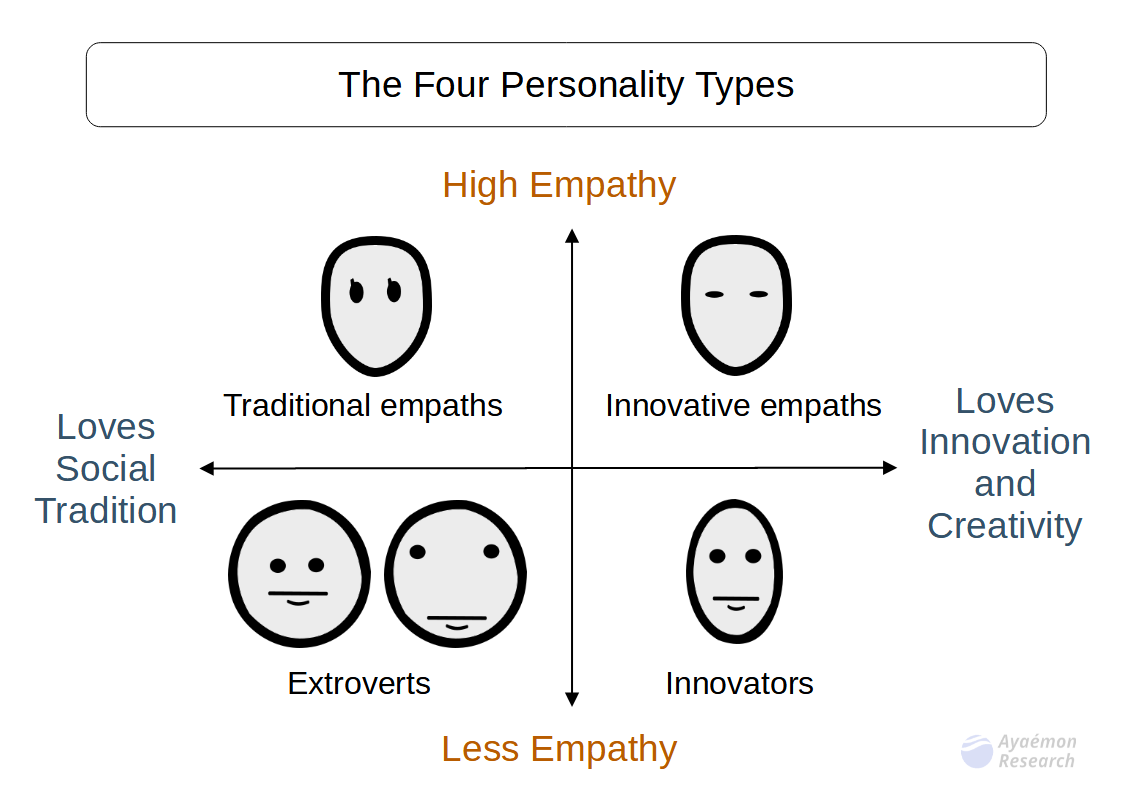Although I said I closed the topics about the Cross-Judging method in the previous article (this article), let me add an explanation. Today, I will talk about the difference in our personalities. It is about the empathic or innovative people I call traditional empaths and innovators.
What kind of life suits us?
Sometimes, we want to know what kind of life suits us. When we are confused about values, we suffer in everyday life because it prevents us from living as we are.
There are typical examples. First, we might try to do things with patience that don’t fit our nature. Next, we might be unable to stop disgusting activities, no matter how we wish to stop them. Finally, we might hesitate to begin the new challenges.

The other values inside us cause them. There are several different values inside us. One of them is an inferiority complex. It is the opposite of our nature. Others are values that are similar but also different from ours. They sometimes confuse us.
Knowing the differences in personalities could solve those mental problems in such a case.
Today, I will explain the differences between the empathic and innovative people I call traditional empaths and innovators.
The four types of personalities
We classify our personalities into four types, as shown in the following image:

Let me explain each of them as follows:
- Extroverts: (Not in use this time)
- Traditional empaths: People who want to stay in the same environment and support it. That makes them prepare for long-term safety. In addition, they tend to be afraid of migration to new environments.
- Innovative empaths: (Not in use this time)
- Innovators: People who can migrate their environment and want to improve themselves or the environment with their creativity. That makes them develop adaptive skills that help them secure short-term to middle-term safety.

The difference between traditional empaths and innovators
Typical differences between traditional empaths and innovators are as follows:
- Traditional empaths prefer long-term safety. Innovators prefer current efficiency.
- Traditional empaths tend to put off decisions to keep opportunities. Innovators tend to make quick decisions to get new opportunities.
- Traditional empaths tend to repress their emotions to avoid the stress of changing their behavior. Innovators accept and release their emotions to change their behavior or environment.
- Traditional empaths wait until the time comes when they can contribute. Innovators try the new environment to find a place to contribute.

Let me explain in detail below.
The difference in the sense of time
First, there is a difference in the sense of time.
Traditional empaths prefer long-term safety to current efficiency because they are not good at conflict. In addition, they are supposed to stay in the same place. People secure safety through conflict, migration, new creations, or savings when their situations worsen. However, they are not good at anything but saving. That makes them prepare and store more.
For example, they like long-term, stable work, even if the salary is lower. When investing, they like diversification, even if it is ineffective. They prefer stability to efficiency.

On the other hand, innovators prefer current efficiency because they can change their environment due to their adaptive capacity. They can learn new things and adapt to new environments soon. In addition, they have predictive power and creativity. That gives them the security to live when the environment gets worse.
That is why they try to find what is most efficient in the current environment. After discovering it or making a prediction, they concentrate on it. Of course, they always think about when the environment reaches its peak. If they see that they or the environment have reached their peak, they move on to the next environment.
It is like surfing. They try to ride a wave, one after another. The wave theory I explained in earlier posts is this tendency. (Tag: wave theory)
The difference in the style of decision
Next, there is a difference in the style of decision.
Traditional empaths prefer to put off decisions rather than make quick ones. It is because they want to stay in the same place. If we keep in the same situation, there are fewer new opportunities. That makes them avoid quick decisions.
For example, they hesitate to cut relationships with people and wait until the situation changes, no matter how exhausting. They are premised on patience.

On the other hand, innovators prefer quick decisions to get new opportunities. It is because they can adapt to the new world. That gives them a clear and rational attitude toward their lives.
They decide immediately. For example, if they find out they cannot get along with people, they go alone, even if it is a disadvantage. They will accept it soon and try to find another way. They know the meaninglessness of the imagination, like, “If I am like them.”
The difference in how they deal with their feelings
Then, there is also a difference in how they deal with their emotions, especially negative ones.
When they feel negative emotions, such as shame, traditional empaths prefer to repress them because they don’t want to change their behaviors. They want to stay in their community.
They kill their emotions as if nothing happened and get on with that shame until the situation changes. That allows them to avoid the stress of changing their behaviors. In addition, if they change their attitudes, that often creates confusion in their surroundings. That confusion stresses them because they don’t want to disturb their surroundings.
Those factors make them repress their emotions. Their wants to stay in the community create their emotional repressions.

On the other hand, innovators prefer to accept their emotions instantly because they can get feedback. Emotion is one of the indicators of his life. If they feel good, it is a good environment. However, if not, it implies they should change their behavior or environment.
That is why they evaluate feeling honest emotions and disregard emotional repression. If people in the environment accuse him of his disability, he accepts his existence and leaves there as long as it is reasonable.
Of course, they keep trying to change their environment. They keep seeking a better place to live, whether people like or hate them.
The difference in the way of contribution
Finally, there is a difference in the style of contribution.
Traditional empaths wait until the time comes when they can contribute, as I mentioned several times above. Staying in the same place gives them peace of mind. That frees them from the stress of changing themselves at the expense of finding new opportunities in the outside world.

On the other hand, innovators keep trying new environments to find a place to contribute. They can seize new opportunities at the cost of the stress of feedback.
How to apply those distinctions
If we are traditional empaths, following the way of its personality will work. Eliminating innovators’ values would free us from an inferiority complex.
However, on the other hand, if we are innovative empaths, the other personality of empathic people, we must balance both because those two are not our inherent personalities. We have both aspects, but we are neither of them.

If we are innovative empaths and have mental problems, perhaps we are too biased toward traditional empaths. That creates mental troubles, such as worrying too much, the inability to make decisions, repressions, or the inability to change the environment.
In such a case, try resting the traditional empath’s personality and stimulating the innovators’ personality inside us. That will give us a stable mind without stimulating an inferiority complex.
Conclusion
The above is the difference in our personalities. This time, I explained about traditional empaths and innovators.
That distinction might allow us to solve our mental problems.
Thank you for reading this article. I hope to see you in the next one.


